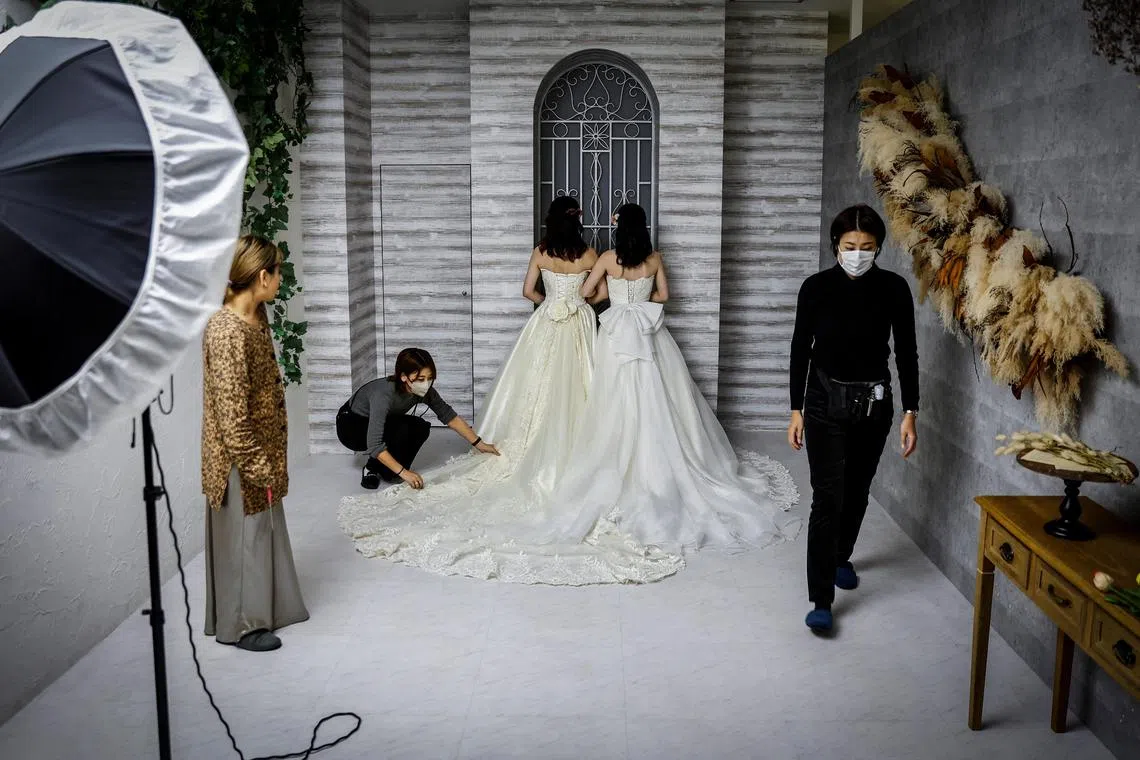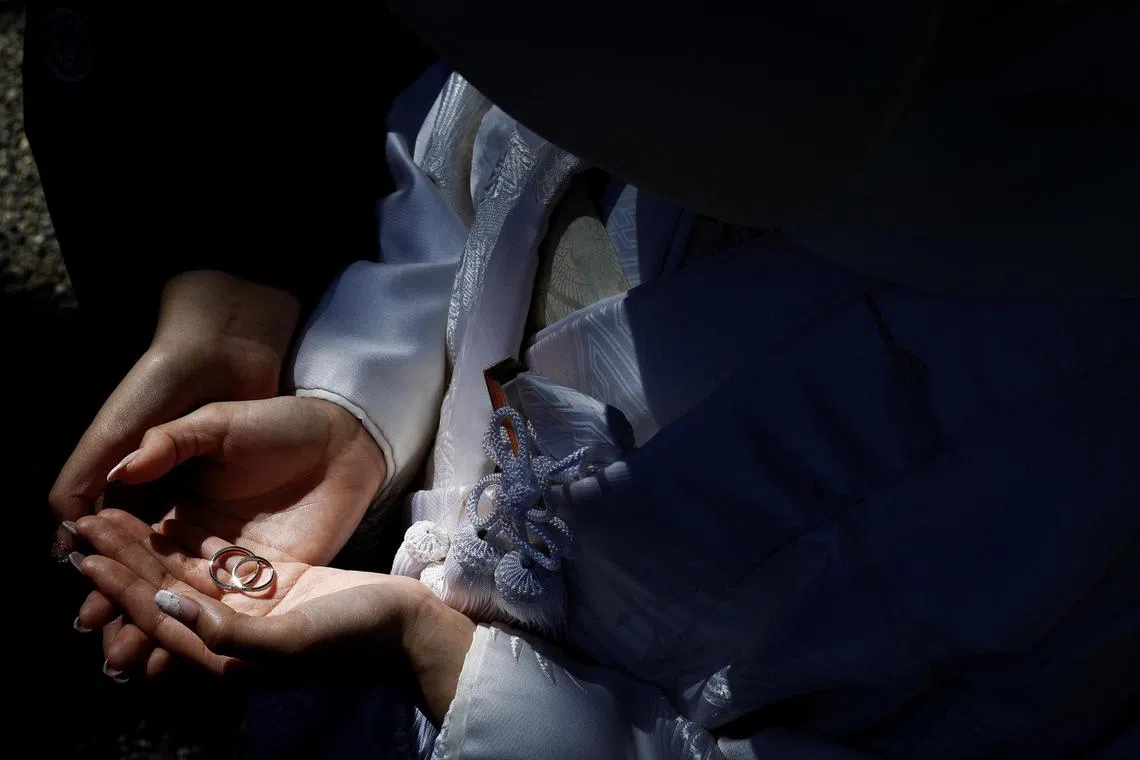Frustrated by Japan’s same-sex marriage ban, LGBTQ couples opt for ‘photo weddings’
Sign up now: Get insights on Asia's fast-moving developments

A transgender couple hiding their faces with a bouquet as they pose for their wedding photos at Onestyle’s studio in Tokyo.
PHOTO: REUTERS
TOKYO – Unable to get married legally in Japan, lesbian, gay, bisexual, transgender and queer (LGBTQ) couples are celebrating their special bond by donning traditional kimonos and fashionable formal wear for elaborate “photo weddings”.
But these carefully choreographed images are often kept hidden in this conservative society, where many LGBTQ people say they face prejudice and stigma, even from their own families.
Reuters spent eight months documenting photo weddings by studio Onestyle in Tokyo and neighbouring Yokohama. The couples spoke to Reuters and allowed their pictures to be taken on condition their identities were protected due to concerns they may face discrimination.
“Not everyone, like my parents or friends, know about our relationship. We thought it would be nice if we could leave a tangible memory just for the two of us,” said a 40-year old female office worker who posed with her 35-year old partner in matching wedding dresses at a studio in Yokohama in November.
She said they struggled to find a studio that would accommodate a same-sex couple for the shoot, which they did on the day they submitted an application to enter a partnership agreement with their local council.
Japan is the only member of the Group of Seven industrialised nations that does not recognise same-sex marriage or provide legal protections for LGBTQ people, despite polls showing public support
While hundreds of municipalities throughout Japan, covering more than 80 per cent of the population, allow same-sex couples to enter into partnership agreements, their rights are limited.
Partners cannot inherit each other’s assets or have parental rights to each other’s children. Being able to visit their loved ones in hospital is not even guaranteed.
The conservative government in 2023 also struggled to pass a law meant to tackle discrimination against LGBTQ groups.
A 53-year-old office worker who suited up for a photo wedding at a chapel in Yokohama with his 45-year-old partner in February said attitudes toward LGBTQ people were shifting, but that society has not caught up.
“I don’t know when that will be, but I think that one day, it would be so common that we don’t even need to use terms like LGBTQ,” he said.
Established in 2015, Onestyle offers photo weddings for more than 2,000 couples a year, and up to 5 per cent of them are people identifying as LGBTQ, founder Natsue Ikeda said.

A bisexual-lesbian couple posing at Onestyle’s studio. Up to 5 per cent of those who have their wedding photos taken at its studios identify as LGBTQ.
PHOTO: REUTERS
“The photos will be our treasure,” said a 32-year-old female graphic designer who took photos with her partner, a 33-year-old transgender man, at Onestyle’s Tokyo studio in August 2023.
“Even if we get hurt by online comments every day, we’d feel our lives would be all right because we’ve already got our photos taken,” she added.
Even though some opinion polls show the majority of respondents support same-sex marriage being legalised, there is a clear generational difference in views.
A Fuji TV survey in 2023 showed 91.4 per cent of respondents in their late teens and 20s were in favour of same-sex marriage, whereas less than half of those aged 70 or older endorsed it.
“My mother told me she would want me to date a man and have a baby,” said a genderqueer office worker who held a photo wedding at a traditional garden in Yokohama in March with a 31-year-old female partner, who’s a nurse.
“My grandmother warned me not to tell my dad and other relatives I am dating a woman because they would think I’m a pervert,” the 27-year-old added.
The couple wore kimonos and a pair of custom-made wedding rings featuring each other’s DNA.
“In my mind, it is just that the person I naturally fell in love with was the same sex,” the office worker said. “I think it is natural that there are people who do not understand this feeling, and I am not trying to force them to understand.”
Some couples said they had been accepted by family members.
“My father had an aversion toward same-sex couples so I was nervous to tell him about living together with a woman,” said a 33-year old woman who works in the service industry. “When I did, he accepted without hesitation.”
The woman and her 32-year-old partner said they would give their wedding photos, taken in Tokyo in November, to their parents as gifts and they would also show them to their friends.

A genderqueer person (left) and a heterosexual woman holding custom-made wedding rings featuring each other’s DNA.
PHOTO: REUTERS
Changes are taking place in Japan, albeit slowly.
Facing pressure at home and abroad, Japan passed legislation in 2023 meant to promote understanding of the LGBTQ community
But the language was watered down from the original Bill after pushback from conservative lawmakers in the ruling Liberal Democratic Party and critics say it provides no human rights guarantees.
In a landmark ruling in March, a high court said Japan’s ban on same-sex marriage was unconstitutional
Lower courts have also delivered mixed verdicts, with one district court holding the ban to be constitutional but others saying it is unconstitutional, to varying degrees.
An Ipsos poll in 2024 found just 29 per cent of respondents in Japan said they supported LGBT people being open about their sexual orientation or gender identity with everyone, the third lowest level of support among 26 countries surveyed.
Thailand and Spain topped the poll with 68 per cent support, while Turkey had the lowest at 21 per cent.
“Legal changes are nice, but they don’t mean much if society as a whole doesn’t start to normalise the existence of LGBTQ people,” said a 46-year-old male office worker who posed for photos with his partner in matching blue traditional haori jackets in November. REUTERS


